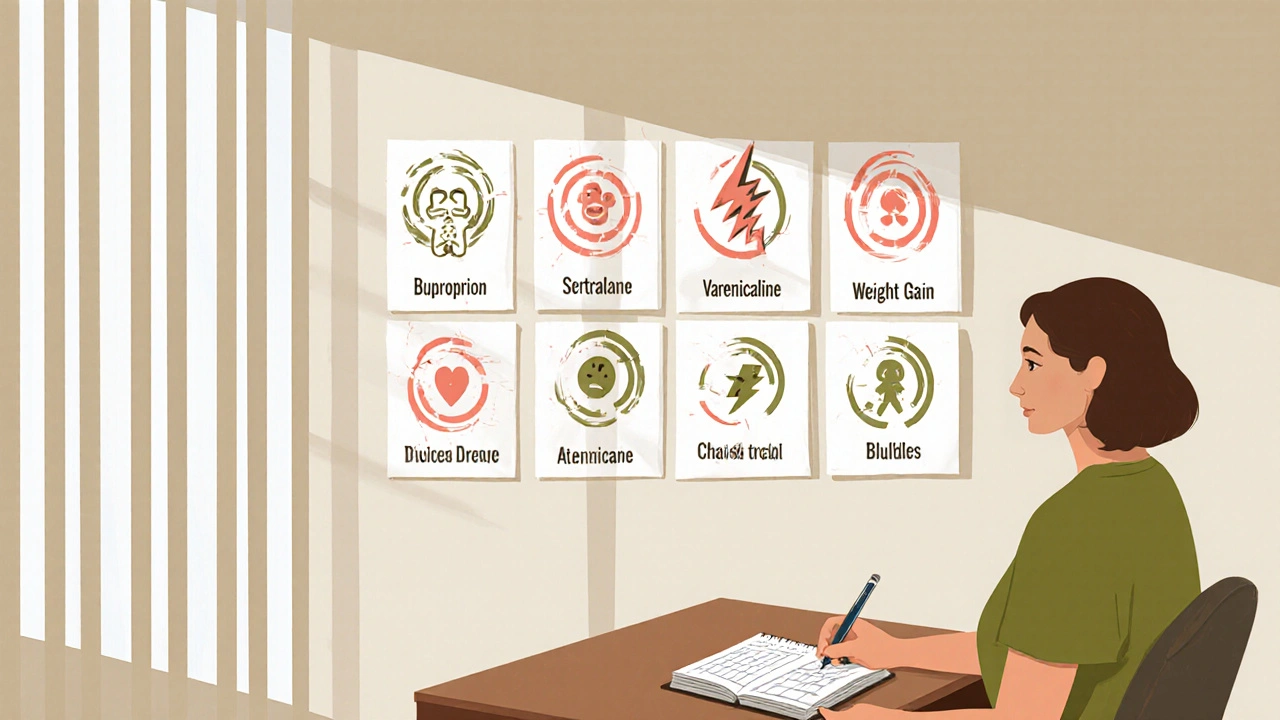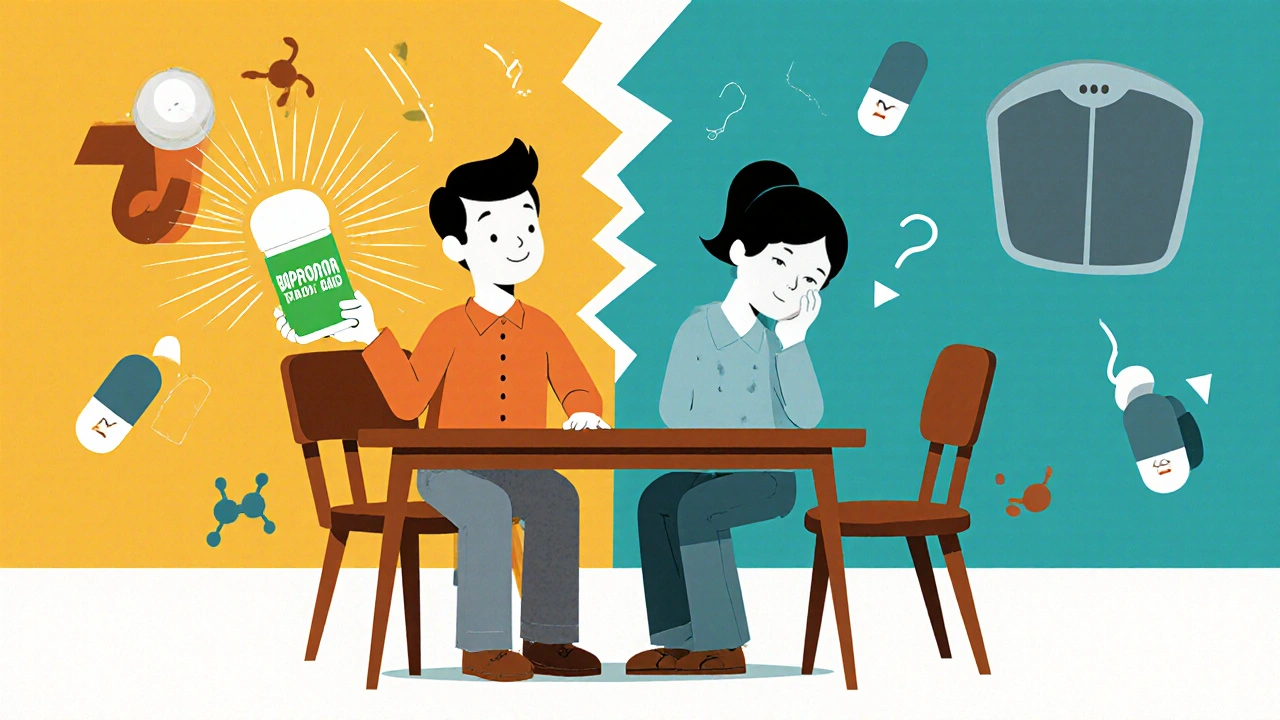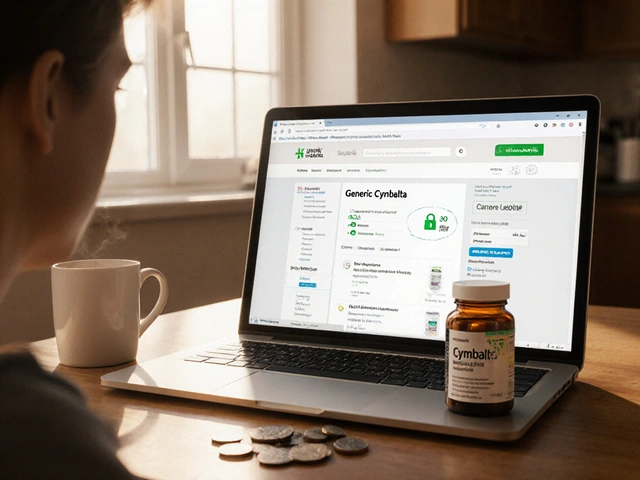Bupropion isn’t just another antidepressant. It’s one of the few that doesn’t typically cause weight gain, sexual side effects, or drowsiness-making it a go-to for people who’ve tried other meds and hit a wall. But it’s not the only option. Whether you’re using it for depression, ADHD, or to quit smoking, knowing what else is out there can make a real difference in how you feel day to day.
What Bupropion Actually Does
Bupropion works differently than most antidepressants. While SSRIs like sertraline or escitalopram boost serotonin, bupropion targets dopamine and norepinephrine. That’s why it’s often chosen for people who feel sluggish, unmotivated, or mentally foggy. It’s not a quick fix-most people notice changes after 2-4 weeks-but for many, it brings back energy without the emotional numbness that comes with other drugs.
The brand name Wellbutrin is what most people recognize, but generic bupropion works the same. It comes in immediate-release (IR), sustained-release (SR), and extended-release (XL) forms. The XL version is most common today because it’s taken once daily and causes fewer side effects like jitteriness or insomnia.
It’s also FDA-approved for smoking cessation under the name Zyban. Studies show it roughly doubles your chances of quitting compared to placebo. That’s why doctors often recommend it for people trying to kick cigarettes, especially if they’ve tried nicotine patches or gum without success.
Why People Look for Alternatives
Not everyone tolerates bupropion. Some get headaches. Others feel anxious, have trouble sleeping, or-rarely-have seizures, especially if they have a history of eating disorders or are taking high doses. If you’re struggling with side effects or it just isn’t working, you’re not alone. Many people switch after a few months.
Here’s what else you might consider, based on what you’re trying to treat.
For Depression: SSRIs and SNRIs
If your main issue is low mood, irritability, or crying spells, SSRIs like sertraline (Zoloft), escitalopram (Lexapro), or fluoxetine (Prozac) are the most common next steps. They’re effective for anxiety too, which often comes with depression.
SNRIs like venlafaxine (Effexor) and duloxetine (Cymbalta) work on both serotonin and norepinephrine-similar to bupropion but with more impact on serotonin. They can help with physical symptoms like chronic pain or fatigue, which bupropion doesn’t always touch.
But here’s the catch: SSRIs and SNRIs are more likely to cause weight gain, sexual dysfunction, or emotional blunting. If you’ve had those issues before, bupropion might still be your best bet-even if it’s not perfect.
For Smoking Cessation: Varenicline and NRT
If you’re using bupropion to quit smoking and it’s not helping, varenicline (Chantix) is the next strongest option. It works by blocking nicotine receptors in the brain, so cigarettes don’t feel as satisfying. Clinical trials show it’s slightly more effective than bupropion at 12 weeks, and just as good at 6 months.
But varenicline has a bigger warning label. Some people report mood changes, nightmares, or even suicidal thoughts. The FDA requires a black box warning for this. If you have a history of depression or anxiety, your doctor might stick with bupropion or suggest nicotine replacement therapy (NRT) instead.
NRT includes patches, gum, lozenges, and inhalers. They’re safer than pills, especially for people with heart conditions or pregnant women. The downside? They don’t tackle cravings as deeply as bupropion or varenicline. Many people use NRT along with one of those pills for better results.

For ADHD: Stimulants and Non-Stimulants
Bupropion is sometimes prescribed off-label for ADHD, especially in adults who can’t take stimulants like Adderall or Ritalin due to anxiety, heart issues, or substance use history. It’s not as strong as stimulants, but it’s better than nothing.
Non-stimulant alternatives like atomoxetine (Strattera) and guanfacine (Intuniv) are FDA-approved for ADHD. Strattera works similarly to bupropion by affecting norepinephrine, but it takes longer to kick in-up to 6 weeks. Guanfacine is often used for kids but can help adults with focus and impulse control.
Stimulants still work best for most people with ADHD. But if you’ve tried them and had bad side effects-insomnia, appetite loss, jitteriness-bupropion might be your most tolerable option.
How They Compare: Quick Table
| Medication | Primary Use | Side Effects | Onset of Action | Weight Impact |
|---|---|---|---|---|
| Bupropion A dopamine and norepinephrine reuptake inhibitor used for depression and smoking cessation | Depression, smoking cessation, ADHD | Insomnia, dry mouth, anxiety, rare seizures | 2-4 weeks | Neutral or weight loss |
| Sertraline (Zoloft) An SSRI antidepressant that increases serotonin levels | Depression, anxiety, OCD | Nausea, sexual dysfunction, weight gain | 4-6 weeks | Weight gain common |
| Venlafaxine (Effexor) An SNRI that affects serotonin and norepinephrine | Depression, anxiety, chronic pain | Nausea, high blood pressure, sweating | 2-4 weeks | Weight gain possible |
| Varenicline (Chantix) A nicotine receptor partial agonist for smoking cessation | Smoking cessation | Nausea, vivid dreams, mood changes | 1-2 weeks | Neutral |
| Atomoxetine (Strattera) A non-stimulant ADHD medication that increases norepinephrine | ADHD | Nausea, fatigue, decreased appetite | 4-8 weeks | Weight loss possible |
When to Stick With Bupropion
You should consider staying on bupropion if:
- You’ve tried SSRIs and hated the sexual side effects or weight gain
- You’re trying to quit smoking and feel less urge to smoke than with patches or gum
- You need to stay alert during the day and don’t want something that makes you drowsy
- You’ve lost weight on it or stayed at a healthy weight
It’s also a smart choice if you have bipolar disorder-bupropion is less likely to trigger mania than SSRIs. That’s why it’s often used in mood-stabilized patients.

When to Switch
It’s time to talk to your doctor about switching if:
- You’re having trouble sleeping and it’s affecting your work or relationships
- You’ve been on it for 8 weeks and feel no improvement
- You’ve had a seizure or have a history of seizures or eating disorders
- You’re pregnant or planning to be-bupropion isn’t the first choice during pregnancy
Switching doesn’t mean failure. It just means you’re listening to your body and adjusting.
What About Natural Options?
St. John’s Wort is sometimes used for mild depression. But it interacts badly with many medications-including bupropion-and can cause serotonin syndrome. It’s not safe to mix.
Exercise, light therapy, and cognitive behavioral therapy (CBT) can help with both depression and quitting smoking. In fact, combining any of these with medication gives you the best shot at long-term success. CBT, in particular, helps rewire the thoughts that make you reach for a cigarette or spiral into sadness.
Don’t treat supplements like magic pills. They’re not regulated like drugs. What’s on the label isn’t always what’s inside.
Final Thoughts: It’s Personal
There’s no single best antidepressant or smoking aid. What works for your friend might not work for you. Bupropion is unique because it doesn’t just lift mood-it gives you energy, reduces cravings, and doesn’t make you gain weight. That’s why it’s so popular.
But if it’s not working, or it’s causing problems, there are other paths. The key is to track your symptoms, talk to your doctor regularly, and give each option enough time to show results. Most people need to try more than one thing before finding the right fit.
Don’t give up because the first pill didn’t click. The right one is out there.
Can you take bupropion with alcohol?
It’s not recommended. Alcohol lowers your seizure threshold, and bupropion already carries a small risk of seizures-especially at higher doses. Mixing them increases that risk. Even moderate drinking can trigger headaches, dizziness, or mood swings. If you’re trying to quit smoking, alcohol is also a major trigger for relapse. Cutting back or avoiding it while on bupropion is the safest approach.
Does bupropion help with anxiety?
It can, but it’s not the first choice. For people whose anxiety comes with low energy or lack of motivation, bupropion can help by boosting dopamine. But if you have panic attacks, social anxiety, or constant worry, SSRIs like sertraline or escitalopram are more effective. Bupropion can even make anxiety worse in some people, especially early on. Always tell your doctor if your anxiety gets worse after starting it.
How long does it take for bupropion to work for smoking cessation?
You should start taking bupropion at least 1 week before your quit date. Most people notice reduced cravings and withdrawal symptoms after 1-2 weeks. The full effect usually kicks in by week 3. Studies show people who stick with it for 7-12 weeks have the highest success rates. Don’t stop too soon-even if you feel better.
Is generic bupropion as good as Wellbutrin?
Yes. Generic bupropion contains the same active ingredient and meets the same FDA standards as Wellbutrin. The only differences are in inactive ingredients like fillers or coatings, which rarely affect how the drug works. Many people switch to generic to save money-sometimes over 80% less. If you notice a change in side effects after switching, talk to your pharmacist. It’s uncommon, but possible.
Can bupropion cause weight loss?
Yes, it’s one of the few antidepressants that often leads to weight loss or prevents weight gain. Studies show people lose an average of 2-5 pounds over 6-12 months, especially if they’re overweight to begin with. This happens because bupropion reduces appetite and increases energy. It’s why it’s sometimes used off-label for weight management in people with depression or binge eating disorder. But it’s not a weight-loss drug-it’s an antidepressant that happens to help with weight.
Next Steps
If you’re on bupropion and wondering if it’s right for you, keep a symptom journal. Note your mood, energy, sleep, cravings, and side effects every few days. Bring it to your next appointment. That kind of detail helps your doctor make better decisions than a vague “I feel okay.”
If you’re thinking about switching, don’t stop cold turkey. Tapering down slowly reduces withdrawal symptoms like dizziness, irritability, or brain zaps. Your doctor can help you plan a safe transition to another medication.
And if you’re not sure where to start, ask about combining medication with counseling. Therapy isn’t a backup-it’s part of the treatment. Whether it’s CBT, mindfulness, or support groups, talking through your struggles makes medication work better.







Debra Callaghan
31 October 2025 - 18:12 PM
Bupropion saved my life. I tried Zoloft and ended up feeling like a zombie with zero libido and gained 15 pounds. This stuff? I got my energy back, stopped craving cigarettes, and didn’t turn into a doughnut. Stop acting like all antidepressants are the same-they’re not.
Mitch Baumann
2 November 2025 - 11:29 AM
It’s fascinating-bupropion’s dopaminergic mechanism is *so* much more neurobiologically elegant than the serotonin-centric SSRIs… which, frankly, are just… *so* overprescribed. 🤔 I mean, have you seen the data on emotional blunting? It’s practically a class effect. 🍃
Gina Damiano
3 November 2025 - 18:07 PM
I’ve been on bupropion for 3 years now and honestly? I forget I’m even on meds. No weight gain, no brain fog, I even started hiking again. But I had to go through 4 different SSRIs before I found it. So many doctors just push Zoloft first like it’s the only option. I wish they’d listen more.
Emily Duke
4 November 2025 - 15:20 PM
Ugh, I tried bupropion… and it made me feel like a jittery raccoon on a treadmill. Anxiety went from ‘mild’ to ‘I need to call my mom and cry for 45 minutes’. SSRIs are safer, period. And yes, weight gain sucks-but at least I didn’t feel like I was gonna explode.
Stacey Whitaker
5 November 2025 - 00:03 AM
Been in Australia for 8 years now and the docs here push varenicline like it’s the holy grail for quitting smoking. But I’ve seen so many Aussies on Chantix crash hard emotionally. Bupropion? Less drama. Less black box warnings. More chill. And yeah, I lost 8 lbs. No regrets.
Kayleigh Walton
5 November 2025 - 21:55 PM
If you’re considering switching meds, please don’t do it on your own. Tapering matters. I went cold turkey off Lexapro once and it felt like my brain was rewiring itself in reverse. Took me 3 weeks to stop feeling like I was underwater. Your doctor is there to help you-not judge you. Talk to them. Keep notes. You’ve got this.
Stephen Tolero
6 November 2025 - 16:26 PM
What’s the comparative seizure risk between bupropion XL and IR formulations? The FDA label mentions dose dependency but doesn’t specify thresholds.
Brooklyn Andrews
7 November 2025 - 20:15 PM
St. John’s Wort + bupropion = bad idea. I did it once. Thought I was being ‘natural’. Ended up in the ER with serotonin syndrome. Don’t be me. Supplements aren’t safe just because they’re ‘herbal’.
Joanne Haselden
9 November 2025 - 05:53 AM
For individuals with comorbid depression and chronic pain, SNRIs offer a dual-action profile that bupropion simply cannot replicate. The noradrenergic modulation of descending pain pathways is clinically significant-particularly in fibromyalgia and diabetic neuropathy. Bupropion’s utility here is limited.
Vatsal Nathwani
11 November 2025 - 01:01 AM
Why do people even care? Just take whatever the doctor gives you. I tried all this stuff. Didn’t change anything. Now I just drink and ignore it. Works better.
Saloni Khobragade
12 November 2025 - 06:37 AM
i took bupropion for 2 months and lost 10lbs but my heart was racing all day. i stopped. now im on zoloft and im fat but at least i dont feel like im gonna die every morning.
Sean Nhung
14 November 2025 - 04:20 AM
Just want to say-bupropion helped me quit smoking AND stop binge eating. I didn’t think that was possible. Still take it 3 years later. No side effects. I’m not a fan of ‘magic pills’ but this one? It’s legit. 🙌